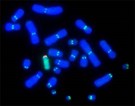Artificial chromosome created


A human artificial chromosome in a Chinese hamster cell. Hamster chromosomes are blue, human artificial chromosome red/green. Centromeres (double dots on the chromosomes) of all chromosomes are labelled (light green) with an anti-centromere antibody. The green color on the human artificial chromosome is a probe for the foreign DNA that has been introduced. The red color is a signal for a satellite DNA sequence that is specific for human chromosome 15, from which the human artificial chromosome was derived.
This is the first published report of a reproducible and effective methodology for generating artificial human chromosomes from predictable sequences. The chromosomes were generated by taking advantage of the intrinsic large-scale DNA-amplification mechanisms of mammalian cells. Csonka's team induced the formation of new human artificial chromosomes by targeting DNA sequences into amplifiable sites in the centromeric/short-arm regions of human acrocentric chromosomes. The chromosomes acquired all the structural and functional elements necessary for chromosome replication. The researchers were able to isolate mitotically stable subclones containing the chromosomes, and they further showed that the integrated marker genes are expressed.
The methodology, which allows researchers to insert a gene into mammalian cells without the risk of disrupting other genes at the integration site, is being used by Chromos to develop the next generation of artificial human chromosomes that can be tested pre-clinically.
Alistair Duncan, president and CEO of Chromos, said: "This peer-reviewed publication provides important validation of the artificial chromosome technology and in particular demonstrates the achievement of an important milestone in the development of novel, large capacity and safe vectors for gene therapy."
This publication follows three recent publications by Chromos and Biological Research Center scientists on advances in artificial chromosome technology:
- "The large-scale isolation of mammalian artificial chromosomes," Cytometry 35: 129-133, 1999.
- "The stability of a functional murine satellite DNA-based artificial chromosome across mammalian species," Chromosome Research 7,:3-7, 1999.
- "The generation of transgenic mice and germline transmission of a mammalian artificial chromosome introduced into embryos by pronuclear microinjection," Chromosome Research 8:183-191, 2000.
Read Artificial Chromosome Passed On for more on this finding.
Chromos is a biotechnology company that is developing and commercializing an artificial chromosome expression system (ACes), an enabling technology which bridges the gap between the breakthroughs in the science of genomics and the development of protein-based therapies. ACes is a novel, non-integrating, non-viral deliverable gene expression system that functions like a natural chromosome. Chromos is developing ACes to produce therapeutic proteins in cellular and transgenic production systems and for gene therapy.
For more information: Eileen Utterson, VP of Corporate Development, Chromos Molecular Systems Inc., 6660 NW Marine Dr., Vancouver, BC, Canada V6T 1Z4. Tel: 604-718-6400. Fax: 604-718-6424.
Edited by Laura DeFrancesco
Managing Editor, Bioresearch Online
